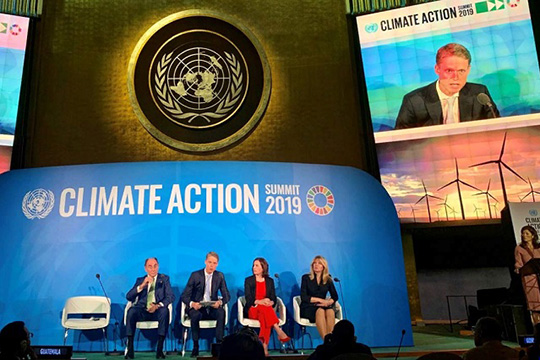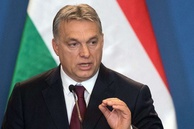While attending the UN Climate Summit in New York, French President Emmanuel Macron urged European environmental activists to look in the direction of some countries of Eastern Europe, in the first place, those that this summer came up against the “EU initiative to achieve carbon neutrality by 2050”.
The 2050 deadline was first voiced in a report prepared last year by the UN Intergovernmental Commission on Climate Change. According to the authors of the Report, humanity will be able to avoid the worst effects of climate change if it reduces greenhouse gas emissions to zero by the middle of the century. The proposal in support of the United Nations initiative by EU countries put forward by the European Commission in November last year envisages a set of measures to reduce greenhouse gas emissions next to zero; and to compensate for the residual emissions by taking agricultural and technological measures aimed at extracting carbon from the atmosphere. [i] In March this year, as members of the European Council discussed the details of the initiative, the initial reaction, according to media reports, was “cautious”. Only 8 EU member states supported it unconditionally [ii].
However, “the situation had changed a lot” by May: the G8 addressed the other EU members with a proposal to fundamentally step up efforts to avert climate change. The participants in the discussion suggested channelling for these purposes a quarter of the total EU budget for the period 2021-2027. In addition, they proposed to introduce a ban on EU subsidies for projects that could worsen greenhouse gas emissions into the environment. And they also called for supporting the Community’s commitment to the “zero emission” target by 2050 “as a deadline.” [iii]. According to observers, what led to a rapid change in the attitude of many EU countries to the issue was a wave of environmental protests that swept through a number of major European cities, including London, Brussels, Stockholm, Paris and Berlin. Also, the change in attitudes could be attributed to the success of the "green parties" in the elections to the European Parliament held in May.
In Eastern Europe, the new “super-ambitious” climate initiatives were met with outright mistrust. During a summit in Brussels at the end of June, Poland, the Czech Republic, Hungary, and, with certain reservations, Estonia, blocked a clause on the implementation of the “2050 Initiative” in the EU strategy for 2019–2024 [iv]. Instead of clearly defined obligations of the European Union, with a fixed deadline of 2050, vague wordings were added to the final document. Under the new agreement, only an “overwhelming majority of member states” intend to achieve a zero impact of their economies on the climate, the so-called “climate neutrality”, by 2050 [v]. The refusal of EU members to unanimously support the new climate strategy has also cast doubt on the commitments undertaken by the EU under the Paris Climate Agreement. At the moment, all EU countries are obliged to reduce greenhouse gas emissions by 20 percent of the 1990 level by 2020. And by 40 percent by 2030. However, many member states cannot meet these requirements, some “significantly”. The decisions taken in Paris in 2015 require signatories to prevent a rise in global temperature by more than two degrees Celsius. And "ideally", the temperatures should not increase by more than 1.5 degrees.
Countries of Eastern Europe came up against the new commitments even despite the “softening” of the original wording. Technically, the EU may soon get back to discussing the initiative: after the EU presidency goes to Finland, the issue can be added to the agenda again. Finland is one of the most ardent supporters of stepping up measures to address climate change. However, the recent failure means that, in practical terms, the EU will be able to return to the problem only after 2024. As they explain their position, the Polish authorities focus on preserving the country's energy security, - up to 80 percent of the country’s electric power is still generated using coal. Warsaw also advocates a substantial increase in subsidies from the EU budget for upgrading the energy sector. The Prime Minister of the Czech Republic has pointed out that it is impossible to predict what course the events will take in 30 years. [vi]. Finally, a country’s formal endorsement of the “2050 Initiative” does not necessarily presuppose unconditional support for the EU climate policy in practice. According to the NGO Climate Action Network Europe, in addition to Poland, the Czech Republic, Hungary and Estonia, a cautious position has been demonstrated by Bulgaria, Lithuania, Slovakia, Romania and Croatia. Austria, Greece, Cyprus and Latvia have a number of reservations.
What are countries of Central and Eastern Europe afraid of? First of all, they fear for the economy. Decades after they switched to market economy, their per capita income is 2 to 2.5 times less than in Germany or France. Less diversification of economies, technologically and infrastructurally outdated generating capacities - all this puts Eastern Europeans on the losing side against the background of the more developed members of the European Union. Meanwhile, many leaders of Central and Eastern Europe owe their popularity with voters to the high rates of economic growth. It is no accident then that the success of the “greens” in Eastern Europe was much more modest than in the west and in the center. Eastern European voters are literally frightened by the high cost of today's “green” technologies, which promise far from clear prospects and only after decades. Politicians cannot but take into account public sentiments at home. In addiiton, the EU economy is slowing down. Even Germany, whose production chains attract many suppliers from the "east", teeters on the brink of recession. Not surprisingly, environmental issues in such a situation are fading into the background. [vii]
In addition, the ambitious slogans about the forthcoming triumph of "green" technologies do not always have a leg to stand on. In February The Economist reported that the income level of traditional energy companies is still higher than the performance of renewable energy projects. The global demand for oil continues to grow by 1-2 percent yearly – just like in the previous fifty years. Most environmental activists are still driving cars and using airplanes. It would be premature to rely on breakthrough technologies, which are not available for mass production yet. The volume of investments in renewable energy sources around the world is about 300 billion dollars a year - a drop in the ocean compared to investments in the development of fossil fuels. And even though they talk much about the early arrival of electric cars, in 2030, up to 85 percent of cars will still be running on internal combustion engines.
Meanwhile, the “2050 Initiative” in its current form is too vague to sound convincing, does not contain any, at least preliminary, estimates of potential costs or possible damage to economic growth. Given the situation, it is very difficult to convince the majority of voters that measures aimed at reducing harmful emissions will not inflict a catastrophic blow to their personal well-being. What makes it all worse is not only by the “bad example” of the USA, which many CEE countries are looking to. After America withdrew from the Paris Climate Agreement in 2017, the Trump administration has been taking steps to revive the national coal industry. Even such environmentally advanced countries as France and Germany have yet to devise a policy that could convince wide sections of society of the benefits of higher prices for eco-friendly products and services. One of the motives behind mass protests of the "yellow vests" in France was fears that that the government would boost taxes under the pretext of the need to "spend more on "green "technologies." As for tax cuts to stimulate the economy, the proposal is not popular with top-level officials in most EU countries. Meanwhile, fiscal incentives, which encourage public support for technological and cultural changes that come handy for combating climate change, are seen by specialists as one of the most reasonable measures that can alleviate the fears of skeptics.
Since most countries of the world are characterized by a "mixed" picture of the "pluses" and "minuses" of global warming, many people in the east of the EU are questioning the point of introducing a fundamental change to the economic structure of several decades in an attempt to reverse the negative climatic phenomena in the environment. Should we focus instead on political, economic and social measures that would help individual countries and associations to adapt to the objective trends in nature? Or, could it be an attempt, under the guise of solving environmental problems, to restrict development opportunities for competitor countries, either present or potential.
In the conditions of ever-increasing rivalry between states, the environmental issue becomes a convenient and attractive tool to discredit the opponents. East Europeans point out that rich countries, including Great Britain and Germany, are still using coal in order to maintain their economic growth. In many cases, it means tax exemptions and even budget subsidies. A dramatic reduction in the use of coal for production purposes and heating needs may require extensive political efforts, including an increase in subsidies from EU funds, for which Western members of the alliance will not be ready for years to come. For some environmental groups, the struggle for the protection of the environment outweighs any objective needs for the development of both individual territories and entire states. At times, it is next to impossible to separate the recklessly sincere idealism from the “lobbying of new-type corporate interests”. As a result, criticism of the fuel-based development model turns out to be an instrument of competition that promotes the interests of the green economy — which is, as it has become clear in recent years, far from ecologically perfect [viii].
The conflict over how to harmonize the environmental policy runs the risk of becoming yet another confirmation of an alarming trend for the EU of late. It turned out that “subsidies from the European Union are no longer part of its policy, which was designed to compensate for the internal imbalance in the EU, but rather a kind of gift for loyalty. We mean the well-known ‘divide-and-rule’ policy ”[ix], a deliberate separation of countries and regions in the Community that are not ready to unconditionally follow the decisions which are passed by the leading countries and Brussels.
Is the EU able to “overcome the de facto economic, social and cultural inequalities” which are still visible among its members? Or will these inequalities be joined by ecological and climatic ones over time?
Finally, radicalism among the ecologists frightens even Western Europeans. Emmanuel Macron demonstrated skepticism over the statements made in the UN by Greta Thunberg, a young Swedish activist who became known throughout the world in 2018 thanks to the idea of a global environmental “strike of school students”. According to the French leader, Thunberg’s “radical” position is destructive because it could trigger antagonism in society. The day earlier, German Chancellor Angela Merkel praised the activist’s speech in the UN, adding, however, that Thunberg had overlooked a number of key trends. The German leader spoke about new technologies and innovations that “play a significant role in energy and climate protection” [x].
The crises of the past decade have “revealed the ever-growing differences within the European Union”, and have significantly undermined the previously unquestionable authority of “old” Europe in the eyes of many residents of the East. Against the background of a continuing asymmetry in the socio-economic situation, many CEE countries have managed to overcome the effects of the global crisis better than their Western partners. A number of observers have even outlined the prospects of turning Central and Eastern Europe into a “new driver” of economic growth within the entire EU [xi]. Under these conditions, it is not surprising that East Europeans are set on preserving the freedom of socio-economic maneuver in climate change issues in order to avoid their unjustified politicization. Russia shares these kinds of aspirations. By ratifying the Paris Climate Agreement, Moscow declares its readiness by joint efforts to work out such a paradigm of relations with nature that would meet the interests of long-term development. Russia is striving to strike a balance between a clean and safe environment, on the one hand, and the preservation of national competitiveness, on the other.
The opinion of the author may not coincide with the position of the Editorial Board
[ii] France, Belgium, Denmark, Luxembourg, the Netherlands, Portugal, Spain, Sweden.
[iii] https://www.bbc.com/news/world-europe-48198646
[iv] https://euobserver.com/environment/145227
[v] https://europa.eu/rapid/press-release_IP-19-5534_en.htm
[vii] https://www.forbes.com/sites/stephenpope/2019/07/07/climate-change-divides-europe/#5ce481c51ef0
[viii] https://onlinelibrary.wiley.com/doi/pdf/10.1111/anti.12261
[ix] https://inosmi.ru/politic/20190527/245149118.html
[x] https://inosmi.ru/politic/20190925/245891213.html
[xi] https://www.dw.com/en/visegrad-group-a-new-economic-heart-of-europe/a-49483505
read more in our Telegram-channel https://t.me/The_International_Affairs

 12:30 03.10.2019 •
12:30 03.10.2019 •



























